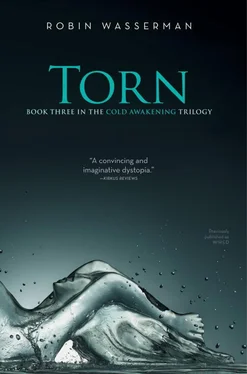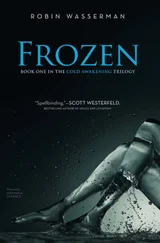We’d gotten a tidy sum from both the car people and the trucking corp, not that we needed either. The principle of the thing, my father had said. Compensation for pain and suffering. I didn’t ask: his, or mine?
I’d studied the report, memorized its key phrases, enjoying the way the legalistic terms sapped the color from what had happened. In the report there had been no pain, no suffering, no imprisonment beneath twisted metal, listening to flames crackle, sirens whine, breathing in the smell of burning flesh. The report was life reduced to its bare essentials, to yes and no, this happened and this did not, life reduced to a schematic of ones and zeros, just like me.
I knew everything about that report.
Which is why I immediately recognized that this wasn’t it.
It started off the same, with the description of the circumstances of the accident—and, of course, the results. The itemization of injuries to the org named Lia Kahn and her vehicle. It was the “causes” section that read somewhat differently. No “mechanical failures.” No “inescapable misfortune.” And no failure of the truck’s guidance system.
In this report blame was assigned: to my car. And the anonymous person who’d tampered with it. If this report was correct, the accident hadn’t been bad luck or bad machinery or bad karma. It hadn’t been an accident at all.
But… if this report was correct, then what had happened to it? And where had the other one come from?
Living as a mech, I’d come to understand that some things could be true and not true at the same time; some things could contain their own opposite. But this wasn’t one of them. If one of the reports was true, it meant the other was a lie.
I turned on the car and directed it toward home. Watched the night flow past. It was like I could feel him drawing closer, pulling me in. My father, my protector.
I went home because there was nowhere else to go. I went home to him because I had to know. My father had given me that first report. He had described the circumstances of the accident, filled in the portions that my trauma-scattered brain couldn’t remember. He had been my memory.
Kahns don’t lie . It had been a family rule for as a long as I could remember. But I was a Kahn, and I lied all the time.
My father’s study was forbidden territory. But my father was asleep, along with the rest of the house. And the ViM embedded in his desk would supply direct access to his zone. Whatever he knew would be buried there, somewhere.
I slipped out of my shoes and padded silently into the room, easing the door shut behind me. It creaked softly, and I froze. But there was no noise from the rest of the house.
I hadn’t snuck in here since I was twelve, the night my father had confiscated my new pink miniViM—consequence of some petty and long forgotten trespass—and I’d decided to confiscate it back. I’d been caught, of course. Then yanked off the ground, carried up the stairs, tossed into my room, and grounded for a month.
I swept a finger across the screen to switch it on. The screen remained blank, save for a password request and a small white box, exactly the size of a thumbprint.
I’d expected the password protection; that wasn’t unusual, especially when it came to someone as paranoid as my father. He had an assortment of passwords he used for various functions, and I’d figured out most of them over the years, so I had been reasonably sure I’d be able to crack this one. But I’d never heard of thumbprint security on a private ViM. And I had no idea how to get past it. Which meant I had to get my answers some other way.
Or just drop this altogether.
“I must still be asleep, because obviously I’m dreaming this.”
I flinched, nearly knocking a glass picture frame off the desk. It wasn’t a photo of Zo and me—since the accident, all photos of his daughters had been quietly but thoroughly expunged from the house. The face in the glass was our mother’s, years younger, her smile shockingly real.
Zo stood in the open doorway, backlit by the hall light, her shadowed face unreadable. “I know Daddy’s golden girl would never sneak into his holy sanctum. Invasion of privacy? Violation of the sacred Kahn Family Law?” She shook her head. “Clearly I’m hallucinating.”
“Shhh! Please.”
“Right.” She wasn’t whispering. “Wouldn’t want to wake him. Wonder what he’d say.”
“When I told him I caught you sneaking through his stuff? Yeah, I wonder.”
“Like he’d automatically believe you over me? Like you’re so trustworthy and I’m so—”
“That’s not what I meant.”
“Yes it is.”
Yes, it was. But I hadn’t meant to mean it.
“And you were right.” She laughed. There wasn’t much humor in it. “You know, you’d be a lot more tolerable if you’d just own your inner bitch.” Zo stepped into the office. “Like you used to.”
“I was not a bitch!”
Now she laughed like I really had said something funny. “Right. And neither was I.”
“Well… I wouldn’t go that far.”
“I blame genetics,” she said. “Look where we came from.” Zo joined me at the desk, peering down at the blank ViM screen. “So, what are we looking for?”
I didn’t answer—I was stuck on that word, “genetics,” the one that seemed to imply, in her mind, some common thread linking us together.
“Well?” Zo prodded. “Or should I call our father down to help?”
“No!” She’d said “we.” It didn’t guarantee I could trust her, but it meant I could try. “There’s something on there that I need to find out.”
“I’m going to need more details, if you want me to find it for you.”
“No point,” I said. “He’s got a thumbprint lock.”
“Of course he does,” Zo said. “Which is why I”—she pulled a strip of clear adhesive off the underside of his desk—“keep the nanotape imprint easily accessible. Sure you don’t want to tell me what you’re looking for?”
I gaped at my sister, who, last I checked, had slept through every comp-sci class she’d been forced to take. Where had she learned about nanotape? And where had she gotten her hands on some?
“Well?”
“Stuff about the accident,” I admitted. “Anything you can find.”
“Somehow I don’t think Dad’s the type to write weepy poetry about his personal tragedies, if that’s what you’re hoping for,” Zo mumbled, but she entered in a password, pressed the nanotape to the thumb pad, and the screen flashed to life. Zo bent over the keyboard and began typing furiously, whipping through files with dizzying speed, not just the obvious news vids and porn, but locked subroutines that unleashed hidden archives and multilayered data dumps.
“I didn’t know you were so good at this stuff,” I said, because it seemed easier than asking why she was helping me.
“When did you know anything about me?” Zo said, with a flash of anger. She didn’t look up until her fingers stopped flying over the keyboard. “There. Done. Everything.”
Everything included several files that my father must have thought he’d deleted. Maybe he’d slept through his comp-sci classes as well, or at least the one where they’d taught that most fundamental of rules: Nothing is ever deleted. Not for good, at least. There were dozens of memos, warnings from BioMax that he was running out of time and better make his choice, references to payouts and consequences, and an ultimate response from our father, with the access code to the car’s navigational system and a time his daughter was guaranteed to be in the car: 3:47 p.m. A time I recognized and remembered, because it was the time of the accident.
There had been a day, not long after my download, when my body had frozen. In the middle of a crowd—in the middle of a step—I’d shut down, turned into a statue, unable to walk, unable to move, unable to do anything but think and watch. I could see people staring at me, swirling around me, and I knew I was nothing more than an object to them, easily ignored, easily circumvented. Easily broken.
Читать дальше












